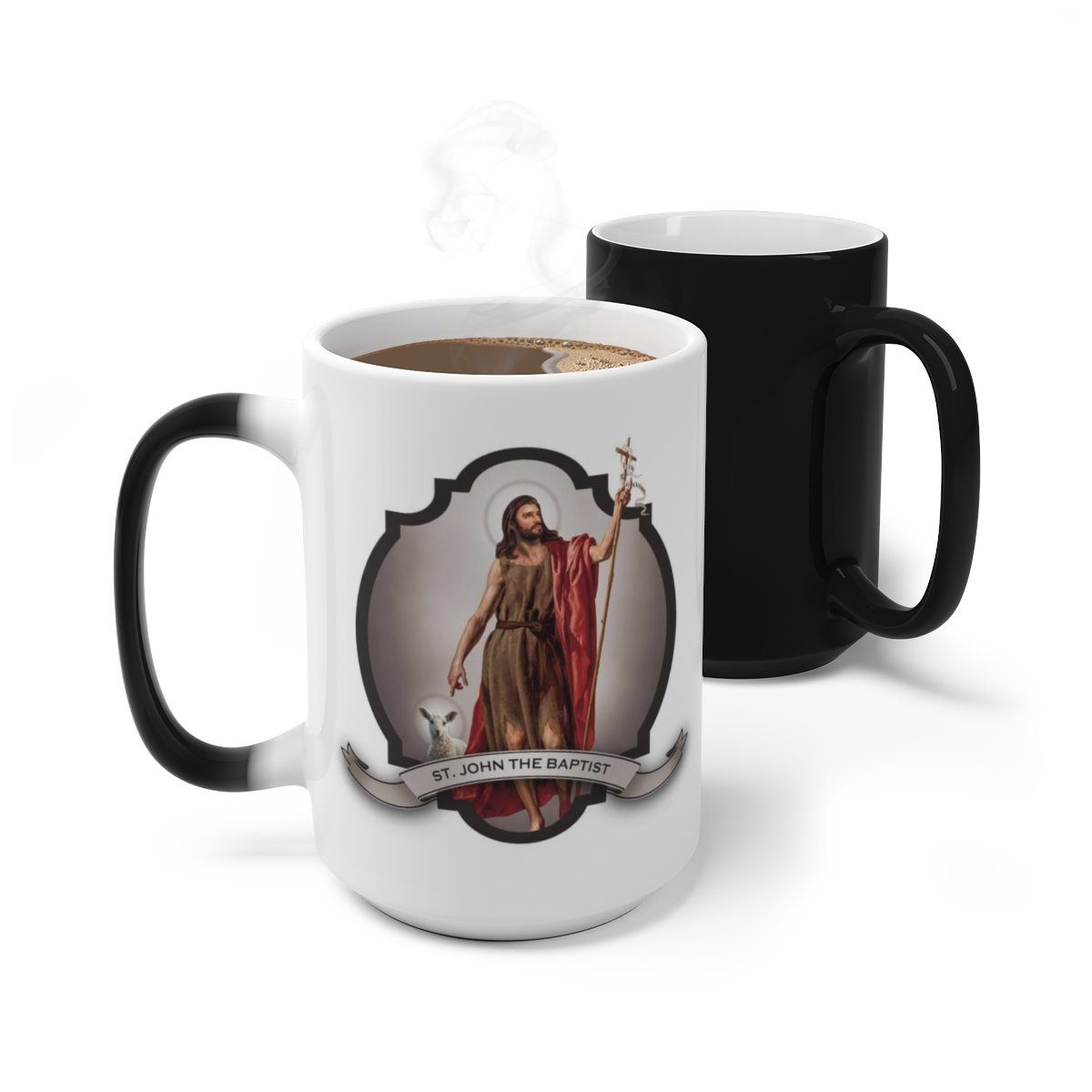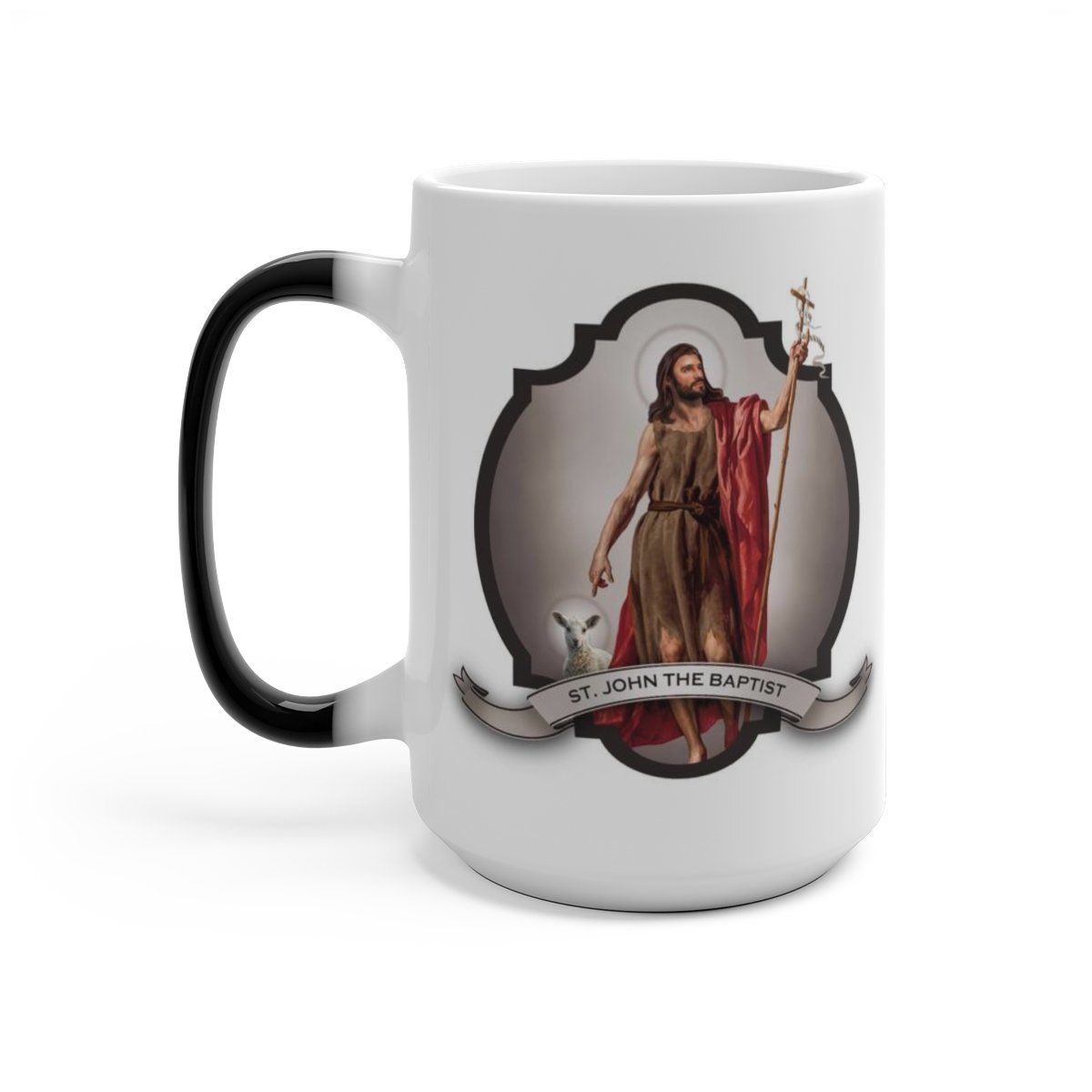


St. John the Baptist Transitional Mug (Latin)
Changing color right before your eyes, the St. John the Baptist Transitional Mug (Latin) will start your day with delight and inspiration. The 15 oz. ceramic mug is a solid, soft black color until hot liquid is added, revealing an image on one side and an inspirational saying on the other. When the mug cools, it will return to being solid black. Start your day with prayer and coffee with the saints! Get one for yourself, collect them all or give this "magical" mug as a gift.
■ Microwave Safe
■ Hand Wash Only
■ AAA ORCA Coating™

This is a couture item which is custom made-on-demand. Our couture collections feature exclusive, custom designs with our signature crown somewhere within the design. Not sold in stores and you won’t find this anywhere else. EXCLUSIVELY AT VENXARA.
Video below featuring St. Mary Magdalene is an example of the color changing effect of the Transitional Mugs.
Shipping + Delivery
This custom made-on-demand Transitional Mug ships world-wide directly from our mug producers in Michigan, USA. Destination tracking is available for most countries. A tracking number will be emailed to you once your order has shipped.
Production Time: 2-5 days
Ship Time: 5-12 days
Please Note: During peak shopping seasons, production and ship time may take a little longer than normal. If you are buying this item as a gift, please order as early as possible. We don't want to disappoint you or the gift recipient with a potentially delayed order.
For countries where tracking numbers are not available, this item should arrive by regular post within 2-4 weeks. Orders that have not arrived within 45 days of order processing are eligible for a free reshipment or a refund.
About St. John the Baptist

ST. JOHN THE BAPTIST
1st Century BC — 30 AD
Feast Day June 24
Patron Saint of baptism, converts, lambs, monastics, book sellers, printers, tailors, bird dealers, heart patients, firefighters, Jordan, Puerto Rico, and French Canada.
At the Annunciation, when the Archangel Gabriel appeared to the Virgin Mary to inform her that she would conceive of the Holy Ghost, he also informed her that Elizabeth, her cousin, was already six months pregnant. Mary then journeyed to visit Elizabeth. Luke's Gospel recounts that the baby "leapt" in Elizabeth's womb at the greeting of Mary.
The sole biblical account of the birth of John the Baptist comes from the Gospel of Luke. John's parents, Zechariah (Zachary) — a Jewish priest — and Elizabeth, were without children and both were beyond the age of child-bearing. During Zechariah's rotation to serve in the Temple in Jerusalem, he was chosen by lot to offer incense at the Golden Altar in the Holy Place. The Archangel Gabriel appeared to him and announced that he and his wife would give birth to a child, and that they should name him John, a name which was unfamiliar in Zechariah and Elizabeth's families.
However, because Zechariah did not believe the message of Gabriel, he was rendered speechless until the time of John's birth. At that time, his relatives wanted to name the child after his father, and Zechariah wrote, "His name is John" whereupon he recovered his ability to speak. Following Zechariah's obedience to the command of God, he was given the gift of prophecy, and foretold the future ministry of Jesus.
John began public ministry around 30 AD, and was known for attracting large crowds across the province of Judaea and around the Jordan River. When Jesus came to him to be baptized, John recognized him and said, "It is I who need baptism from you."
Jesus told John to baptize Him anyway, which he did, whereupon the heavens opened, and the Spirit of God was seen like a dove. The voice of God spoke, saying, "This is my beloved Son, in whom I am well pleased."
John instructed his followers to turn to Christ, calling Him the "Lamb of God" and these people were among the first Christians.
Following his baptism of Christ, John's popularity grew so much that he alarmed King Herod. Herod ordered him arrested and imprisoned.
John spoke with Herod on several occasions and condemned his marriage to his half-brother's wife.
This condemnation would be his downfall as King Herod promised to grant a wish to his daughter. In revenge for John the Baptist's condemnation of her mother's scandalous marriage to Herod, she asked for John's head. King Herod reluctantly obliged and John was beheaded.
Jesus called John the greatest of all those who had preceded him: “I tell you, among those born of women, no one is greater than John ...” The greatness of John, his pivotal place in the history of salvation, is seen in the great emphasis Luke gives to the announcement of his birth and the event itself — both made prominently parallel to the same occurrences in the life of Jesus.
Choose options



